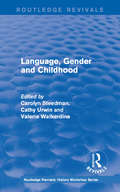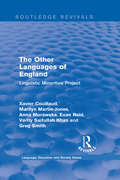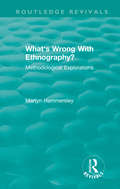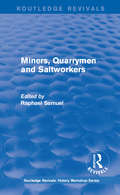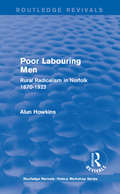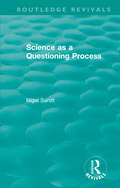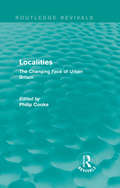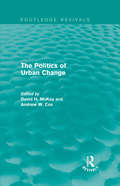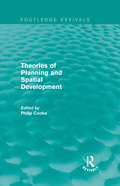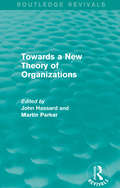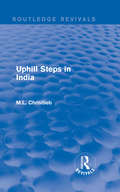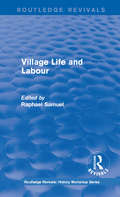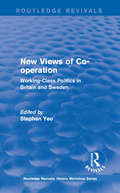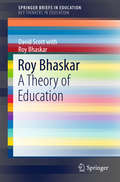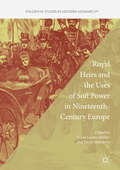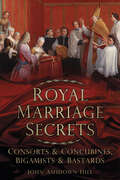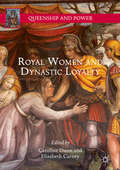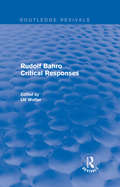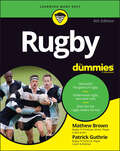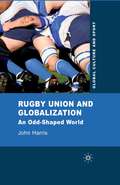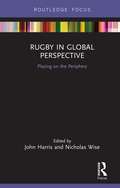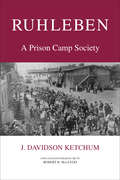- Table View
- List View
Routledge Revivals: Language, Gender and Childhood (Routledge Revivals: History Workshop Series)
by Carolyn Steedman, Cathy Urwin and Valerie WalkerdineFirst published in 1985, this book brings together recent work on women and children from the nineteenth-century to the present. The contributors explore in different ways, and from different points of view, the way in which issues of language have been — and are still — central to the history of women and their relation to domestic and educational practices. A crucial issue is the contrast between what it spoken about girls and women, and what girls and women can speak about. The contributors relate this theme specifically to women’s position as mothers and the education of girls and women.
Routledge Revivals: Linguistic Minorities Project (Routledge Revivals: Language, Education and Society Series #2)
by Greg Smith Xavier Couillaud Marilyn Martin-Jones Anna Morawska Euan Reid Verity Saifullah KhanThe ‘other’ languages of England — those which originate in South and East Asia, and Southern and Eastern Europe — are now important parts of everyday life in urban England. First published in 1985, this book gives detailed information about which languages are in widespread use among children and adults, patterns of language use in different social contexts, the teaching of these community languages inside and outside of mainstream schools, and the educational implications of this linguistic diversity for all children in England. They authors argue that this continued and widespread bilingualism is a valuable potential resource for both the speakers and society as a whole.
Routledge Revivals: Methodological Explorations (Routledge Revivals)
by Martyn HammersleyOriginally published 1992 What's Wrong With Ethnography? provides a fresh look at the rationale for and distinctiveness of ethnographic research in sociology, education and related fields. Relativism, critical theory, the uniqueness of the case study and the distinction between qualitative and quantitative research are all examined and found wanting as a basis for informed ethnography. The policy and political implications of ethnography are a particular focus of attention. The author compels the reader to re-examine some basic methodological assumptions in an exciting way.
Routledge Revivals: Miners, Quarrymen and Saltworkers (Routledge Revivals: History Workshop Series)
by Raphael SamuelIndustrial discipline in mining, quarrying, brickmaking and other classes of mineral work was very different to that in nineteenth-century factories and mills. First published in 1977, this book deals with mineral workers of every class and discusses the peculiarities and common features of their work. It offers three detailed local studies: pit life in County Durham, slate quarrying in North Wales, and saltworkers in Cheshire alongside an introductory section on mineral workers in general. The author is concerned with the family and community setting; the social relationships at the point of production itself; job control and trade unionism; and with material culture, wages and earnings.
Routledge Revivals: Rural Radicalism in Norfolk 1870-1923 (Routledge Revivals: History Workshop Series)
by Alun HowkinsFirst published in 1985, this book presents the first detailed account of the relationship between the farmworkers, trades unionism, and political and social radicalism. Rural radicalism, one of the most important new features of late-nineteenth and early-twentieth century politics, was particularly strong in Norfolk and as such provides the focus for this study. The author shows the how relationship between ‘master and man’ and ‘man’ and ‘work’ was changing in the period from the 1870s to the 1920s — ending with the great strike of 1923. The main themes are the shifts from religion to politics, from Liberalism to Labour, and in more general terms from local to national consciousness. The book shows men at work and the ways in which politics meshed — or failed to mesh — together. Based on detailed local research and on many hours of recorded interviews, it enables the voice of the labourer to be heard, and a real sense of hope, fear and aspiration to come through.
Routledge Revivals: Science as a Questioning Process (Routledge Revivals)
by Nigel SanittFirst published in 1996, Science as a Questioning Process evaluates scientific theories through from Darwinian evolution to relativity, and from quantum theory to cosmology. It offers an examination of these theories, in terms of a compromise between resolvable empirical questions, and theoretical questions left unresolved. The book asks questions that deal with both intellectual and public concern about what science tells us, and how reliable it is. Through this novel perspective, the book examines science in the context of everyday culture and the role it plays in everyday life. This book will be of interest to anyone working in the fields of philosophy, sociology and science.
Routledge Revivals: The Changing Face of Urban Britain (Routledge Library Editions: Social Theory Ser.)
by Philip CookeFirst published in 1989, this book examines seven different localities, ranging from the outer suburbs of large northern cities to small freestanding town, which were prospering in the 1980s or struggling against the negative employment effects of restructuring. Within the theoretical frame of ‘industrial restructuring’, it traces the development of each locality, exploring in depth the influence of several key elements — deindustrialisation, technological change, the shift to the services in employment — on social composition, political change and local policy. A major contribution to locality studies, this book is essential reading for students of urban and regional studies, and sociology.
Routledge Revivals: The Politics of Urban Change (1979)
by David H. McKay Andrew W. CoxFirst published in 1979, this book examines key planning policy areas such as land use planning, land values, housing and slum clearance, urban transport, industrial and regional economic location policies, and policies inner city policies to explain why particular policies have been adopted at particular times — assessing the role of political parties, bureaucrats and interests in setting the national policy agenda. Policy is also placed in the broader economic and social context and the question of whether, given contemporaneous constraints, a coherent national urban policy is possible is examined. Its focus on political parties’ role in urban change at the start of Thatcher-era upheavals makes this book especially valuable to students of urban sociology and the history of planning.
Routledge Revivals: Theories of Planning and Spatial Development (Routledge Revivals)
by Philip CookeFirst published in 1983, this book attempts to unify two bodies of theory which had become severely disjointed. Theories of the planning process had become detached from those of the urban and regional processes which are the subject of planning intervention. The author argues that major weaknesses of planning intervention in cities and regions have resulted from this split, and shows how it is possible to develop an integrated theory of the relationship between planning and spatial development. The mechanism which helps to unify the two fields is the division of labour. This poses problems for the planning system as its spatial requirements change but it depends upon the state planning framework in order to overcome those obstacles — hindering its capacity for spatial reorganisation. This book offers a thorough analysis of these obstacles and requirements by references to contemporaneous theoretical advances in the study of the development process, the state (especially at sub-national level), and the labour market. It is argued that the way capital makes use of urban and regional space can be explained by using the theoretical framework which is developed and, on this basis, point to certain innovative ways in which the processes underlying urban and regional de-industrialisation may be countered.
Routledge Revivals: Towards a New Theory of Organizations (1994)
by Martin Parker John HassardFirst published in 1994, the essays collected in this book explore the impact and current status of the ideas put forth in David Silverman’s The Theory of Organizations, and how they relate to future directions in organization theory. After opening with a chapter by Silverman himself, the subsequent chapters investigate key issues in the study of organizations, including structure and agency, the politics of organization theory, and the meanings of post-positivist organizational analysis. Contemporaneous debates on postmodernism, the emotions, gender and structuration are discussed in the context of the development of organizational theory in the preceding twenty-five years — providing insights into the continuities within organizational theory and provoking thought about future directions.
Routledge Revivals: Uphill Steps in India (1930)
by M.L. ChristliebFirst published in 1930, the author asserts that this book presents a human India ‘in all sorts of conditions and moods’. It details her first-hand experiences as a female missionary in India over the course of thirty-three years in India along with some further accounts related by eyewitnesses. It avoids proposing theories of giving abstract general pronouncements but instead focuses on the individual people with the intention that it would promote greater understanding of the nation by westerners. This book will be of interest to students of Indian, colonial and women’s history.
Routledge Revivals: Village Life and Labour (Routledge Revivals: History Workshop Series)
by Raphael SamuelFirst published in 1975, this volume aims to direct attention at a number of aspects of the lives and occupations of village labourers in the nineteenth-century that have been little examined by historians outside of agriculture. Some of the factors examined include the labourer’s gender, whether they lived in ‘closed’ or ‘open’ villages and what they worked at during the different seasons of the year. The author examines a range of occupations that have previously been ignored as too local to show up in national statistics or too short-lived to rank as occupations at all as well as sources of ‘secondary’ income. The analysis of all of these factors in related to the seasonal cycle of field labour and harvests. The central focus is on the cottage economy and the manifold contrivances by which labouring families attempted to keep themselves afloat.
Routledge Revivals: Working-Class Politics in Britain and Sweden (Routledge Revivals: History Workshop Series #9)
by Stephen YeoFirst published in 1988, this book sets out to reinterpret the changing place of working-class association in capitalist Britain. It argues that in combination, co-operation and association constitutes labour’s power — what is has to work with and who to work for — yet social historians have tended to overlook such views in a co-operative setting. What was the struggle, what form did it take, who were the protagonists and what relevance did they have to the community co-operators of the 1980s? The essays collected in this book explore class potential and class conflict within and against co-operative thought and practice.
Rowing Inland (Made in Michigan Writers Series)
by Jim DanielsRowing Inland, Jim Daniels’s fifteenth book of poetry is a time machine that takes the reader back to the Metro Detroit of his youth and then accelerates toward the future. With humor and empathy, the author looks at his own family’s challenges and those of the surrounding community where the legacy handed down from generation to generation is one of survival. The economic hits that this community has to endure create both an uncertainty about its future and a determined tenacity. Divided into four sections, Rowing Inland calls out key moments from the author’s life. The events that inspire many of these poems took place a long time ago and often it has taken the poet his entire life to write about those experiences and write about them with the necessary emotional distance. For example, some of the poems in the section “Late Invocation for Magic” reference the first girl he ever kissed and her accidental death by fire. In the last section of the book, Daniels approaches the current political and social standings in Detroit with lines like, “The distance to Baghdad or Kandahar / is measured in rowboat coffins / while here in the fatty palm of The Mitten / minor skirmishes electrify tedium.” Although it focuses on Detroit’s metropolitan area, the book can be considered a snapshot of working-class life anywhere across the country. Daniels casts his lens on a way of life that is often distorted or ignored by the powers that be. He zooms in on street level where all the houses may look alike but each holds its own secrets and dreams. To paraphrase novelist and screenwriter Richard Price, Detroit is the “zip code for [Daniels’s] heart”—a place that his writing will always come back to. Readers of contemporary poetry with a regional persuasion will enjoy this collection.
Roy Bhaskar
by David Scott Roy BhaskarThis book provides an account of an original educational philosophy, developed by one of the most significant philosophers of the late twentieth and early twenty-first centuries, Roy Bhaskar. Though he directed his attention to wider matters than education, his philosophy has implications for the way we can understand how the world is structured and in turn how we can transform it to accommodate a desire for a better arrangement of resources for human well-being. It is thus both a theory of mind and world and in addition, a theory of education. Roy Bhaskar's philosophy has a view on the following important matters: intentionality, agential capacity, materialism, the possibility of describing and changing the world, progression, education and the lifecourse, essentialism and human nature, pedagogy, knowledge and knowledge-development, the formation of the self, curricular aims and objectives, being with other people, the self in the learning process, the relationship between the self (or agency) and the environment, stratification, emergence, representation and its different modes, structures and mechanisms, the dialectic and criticality.
Royal Heirs and the Uses of Soft Power in Nineteenth-Century Europe
by Frank Lorenz Müller Heidi MehrkensThis volume brings together a fascinating selection of studies exploring the soft power tools used by heirs to the throne in order to enhance the communication of monarchies with their audiences during the nineteenth-century. How we perceive royals and their dynasties today - as families, as celebrities, as charitable figureheads of society or as superfluous relics of a bygone age - has deep roots in the monarchical cultures of nineteenth-century Europe. By focusing on the role played by heirs to the throne, this volume offers an original perspective on the ability of monarchies to persuade sceptical audiences, nourish positive emotions and thereby strengthen the position of each dynasty within its respective nation. Using examples from Britain, Italy, Spain, the Netherlands, Austria, Greece, Sweden, Norway and Prussia, an international team of experts analyzes and explains the development of the very soft power tools which are still being used by Ruling Houses today.
Royal Marriage Secrets: Consorts and Concubines, Bigamists and Bastards
by John Ashdown-HillWith a new royal baby we witness fundamental changes in the succession laws, but then rules governing the royal weddings and the succession to the throne have always been shifting. So what is MARRIAGE and who decides? What special rules govern ROYAL MARRIAGE and when did they come into force? How have royal marriages affected history? Were the ‘Princes in the Tower’ illegitimate? Did Henry VIII really have six wives? Was Queen Victoria ‘Mrs Brown’? how were royal consorts chosen in the past? Did some use witchcraft to win the Crown? History has handled debateable royal marriages in various ways, but had the same rules been applied consistently, the order of succession would have been completely different. Here, all controversial English and British royal marriages are reassessed together for the first time to explore how different cases can shed light on one another. Surveying the whole phenomenon of disputed royal marriage, the author offer some intriguing new evidence, while highlighting common features and points of contrast.
Royal Women and Dynastic Loyalty (Queenship and Power)
by Elizabeth Carney Caroline DunnRoyal women did much more to wield power besides marrying the king and producing the heir. Subverting the dichotomies of public/private and formal/informal that gender public authority as male and informal authority as female, this book examines royal women as agents of influence. With an expansive chronological and geographic scope—from ancient to early modern and covering Egypt, Great Britain, the Ottoman Empire, and Asia Minor—these essays trace patterns of influence often disguised by narrower studies of government studies and officials. Contributors highlight the theme of dynastic loyalty by focusing on the roles and actions of individual royal women, examining patterns within dynasties, and considering what factors generated loyalty and disloyalty to a dynasty or individual ruler. Contributors show that whether serving as the font of dynastic authority or playing informal roles of child-bearer, patron, or religious promoter, royal women have been central to the issue of dynastic loyalty throughout the ancient, medieval, and modern eras.
Rudolf Bahro Critical Responses: Critical Responses (Routledge Revivals)
by Ulf WolterThis title was first published in 1980. This volume is a collection of essays on Rudolf Bahro and his ideas in Eastern Europe, of informing of a third way in the traditin of antiSalinist opposition, his contribution to the philosophy of socialism, his alternaive wiriting of history and state socialism.
Rugby For Dummies
by Mathew Brown Patrick GuthrieRugby basics for fans, players, and parents who are new to the game, plus all the latest developments for those returning to the sport Rugby For Dummies, Fourth Edition teaches you the essential elements of the fast-growing sport of rugby, so you can follow all the action—and get ready for the U.S.-hosted 2031 and 2033 Rugby World Cups. This helpful Dummies guide also gives you the information that you need to start playing or coaching rugby. You’ll get clear explanations of the rules, insight into strategy and tactics, and info on all the most popular tournaments around the globe. Learn about the rugby greats of yesterday, plus get updates on the most significant changes at every level, from high school to international level. This new edition covers the evolution of the laws that govern play and looks at how the women’s game and the sevens version of the sport have grown. Learn how rugby is played, including necessary skills and strategies for winning Take a look at the most entertaining North American and international rugby competitions Get tips for joining a rugby team or becoming a rugby coach Familiarize yourself with the history of previous World Cups in time for the next oneThis is the perfect Dummies guide for anyone who wants to better understand all aspects of the game of rugby.
Rugby Union and Globalization
by John HarrisIn 1995 rugby union finally became a professional sport following more than a century as an amateur game. Thisbook offers a critical analysis of the sport in the professional era and assesses the relationship between the local and the global in contemporary rugby union. "
Rugby Union and Globalization: An Odd-Shaped World (Global Culture and Sport Series)
by J. HarrisIn 1995 rugby union finally became a professional sport following more than a century as an amateur game. This book offers a critical analysis of the sport in the professional era and assesses the relationship between the local and the global in contemporary rugby union.
Rugby in Global Perspective: Playing on the Periphery (Routledge Focus on Sport, Culture and Society)
by John Harris Nicholas WiseThis book critically examines how rugby union has developed in recent years, in nations on the periphery of the sport. Focusing on people and places on the fringes, it examines contemporary issues and challenges within the global game. Such a collection is timely, as the sport’s governing body seeks to expand influence and participation beyond the eight core nations, with the 2019 Rugby World Cup in Japan being the first time that that tournament has taken place outside of the core. Presenting case studies from Europe, Africa, North and South America, Asia and the Middle East, this collection offers an interdisciplinary account of a sport that is undergoing a period of significant change. Through examination of topics such as the development of rugby sevens and the growth of women’s rugby, it considers what the future may hold for the sport. Rugby in Global Perspective is important reading for students of sport in society, the globalisation of sport, sports studies, sport development and associated fields. It is also a valuable resource for academic researchers working in rugby union or sport in the peripheral rugby nations, as well as those with an interest in cultural geography, sociology, development studies, events studies, event management and sport management.
Ruhestandsentscheidungen im Haushaltskontext: Der Einfluss partnerschaftlicher Machtverhältnisse (Alter(n) und Gesellschaft)
by Andreas KronederDer Übergang in den Ruhestand ist für viele Betroffene ein biographischer Einschnitt. Eine Vielzahl von Aspekten bestimmt dabei die Entscheidung über das „Wann“ und „Wie“ des Renteneintritts. Ein Aspekt bleibt in der wissenschaftlichen Diskussion eher unberücksichtigt: der Einfluss des persönlichen Umfelds bzw. des Haushaltskontexts. Die vorliegende Studie widmet sich diesem und fokussiert dabei im Besonderen den Einfluss partnerschaftlicher Machtverhältnisse. Anhand einer Sekundäranalyse qualitativer Daten, die im Zuge einer Untersuchung zur Koordination der Ruhestandsentscheidungen von heterosexuellen Doppelverdiener-Paaren entstanden sind, werden die Machtstrukturen genauer untersucht.Dabei werden fünf Typen entwickelt, die zeigen, wie die paarinternen Einflussverhältnisse auf unterschiedliche Weise in die (individuellen) Ruhestandsentscheidungen eingreifen können. Die Studie zeigt darüber hinaus, dass diese dabei nicht alleine verantwortlich sind, sondern dass es auf Haushaltsebene immer zu einem Zusammenspiel mit anderen Aspekten der Ruhestandsentscheidung kommt. Zugleich weist die Studie darauf hin, dass die Partnerschaft von heterosexuellen Doppelverdiener-Paaren nicht ausschließlich als Unterstützungsfaktor beim Übergang in den Ruhestand zu verstehen ist, sondern dass sich zahlreiche Abhängigkeitsstrukturen zwischen Partnerin und Partner verstärken und verschieben können. Da bis jetzt ähnliche Untersuchungen im Feld der Retirement Studies nicht bekannt sind, wird die Studie ihrem explorativen Charakter gerecht.
Ruhleben: A Prison Camp Society (Heritage)
by J. Davidson KetchumThis is an unusual book in that it is an important contribution to social psychology and also an absorbing story of four strange years in a German prison camp of World War I. Four thousand men and boys from the most varied walks of life—professors, seamen, jockeys, schoolboys, bank directors, musicians, clerks, scientists—were taken from civilian life and placed in Ruhleben on the outbreak of war; no activities were prescribed for them, no direction was given to their communal life. In the event, this miscellaneous group of people, closed off from the world, create d their own society. This book is the story of how they did it and what the society they made was like; much more than this, the camp provides a gifted and sympathetic social psychologist with a rare opportunity for study and analysis of an important if inadvertent social experiment. The time elapsed between the event itself and the completion of the book may in one way be regretted; it did, however, allow the author, who was himself and inmate of Ruhleben, the opportunity for mature reflection on its meaning. The book is a contribution to the history of World War I; it is also a basic and timeless study of the dynamics of individual and group behaviour.
